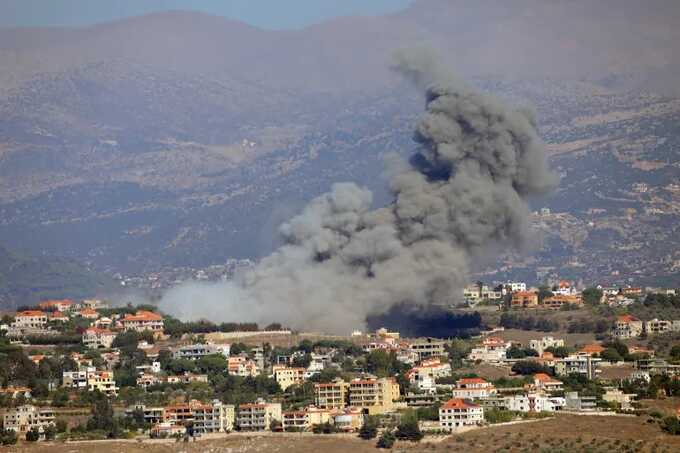US appears unable to dissuade Netanyahu from his planned invasion of Lebanon

An emboldened Israel appears to believe it can safely ignore a lame duck US president and grab the chance to reset the Middle East’s security dynamics
The Biden administration is losing influence over whether Benjamin Netanyahu launches a ground invasion into southern Lebanon or not.
For more than a year, Joe Biden and his senior advisers have managed to forestall an Israeli ground incursion into Lebanon in fear of a larger war that could envelop the entire Middle East.
In the days after the 7 October attack, Biden phoned Netanyahu to talk him out of a massive retaliation against Hezbollah, which had begun firing guided rockets against Israeli positions following the Hamas raid.
In April this year, Biden also told Netanyahu that the US would not support Israel in an offensive war against Iran after Tehran launched dozens of loitering munitions, cruise missiles and drones toward Israel.
But on Monday, US outlets reported that Netanyahu’s administration had told White House officials they were planning a limited ground incursion into Lebanon, essentially escalating a conflict with Hezbollah and its backer Iran to a level that Biden and his team have tried desperately to avoid.
The Washington Post reported that Israel was planning a limited campaign – smaller than its 2006 war against Hezbollah – that nonetheless would mark a drastic escalation with Hezbollah and Iran. The New York Times suggested US officials believed they had talked Israel out of a full invasion of Lebanon, but that smaller incursions into southern Lebanon would continue.
But Yoav Gallant, the Israeli defence minister, has briefed a meeting of local council heads in northern Israel on Monday, according to the Times of Israel. “The next stage in the war against Hezbollah will begin soon … We will do this. And as I said here a month ago [that] we will shift the center of gravity [to the north], this is what I say now: we will change the situation and return the residents home.”
Earlier that day, he had told Israel Defense Forces soldiers that to return some 60,000 Israelis to their homes in the country’s north, we “will use all the means that may be required – your forces, other forces, from the air, from the sea, and on land”.
The plan to attack comes at a unique moment – with war hawks dominating domestic Israeli politics at the same time as a lame duck Biden administration appears increasingly unable or unwilling to intervene in the conflict. And, according to analysts, Netanyahu believes he has a limited window around the US elections to attack Iranian proxies across the region.
With just a month left until the US presidential elections, the Biden administration has launched a tepid effort at a ceasefire that Netanyahu appears to have chosen to ignore – or simply to wait out until US elections that could bring in a Trump administration that would do even less to restrain him than the current one has.
“Netanyahu made a calculation, and the calculation was that there was no way that the Democrats between now and November 5th [election day] could do anything that would criticise, let alone restrain him from that,” said Aaron David Miller, a senior fellow at the Carnegie Endowment for International Peace, who focuses on US foreign policy and the Middle East.
“You saw [vice-president Kamala] Harris’s statement, you saw the White House statement, you saw the Democrat and Republican consensus on the killing of Nasrallah and what the Israelis have done there,” he said. “And since Iran is involved in this, unlike in Gaza, the toxicity of animus against Iran in this town is so intense that the Republican party, which is now the ‘Israel can do no wrong’ party, is just winging for the administration.”
Until recently, prominent US officials have thought they still had a chance to conclude a ceasefire and prevent the war from escalating further. Last week, US and French officials along with dozens of other countries called for a ceasefire in Lebanon. US officials briefed on the matter said they believed the “time was right” and that Israel would sign up.
A western official last week told the Guardian that the Israeli threat to invade northern Lebanon was probably “psyops” largely designed to force Hezbollah and Iran to the negotiating table.
But, at the same time, the official said, the situation in the region was extremely volatile, and could be upset by as little as a single drone strike against a sensitive target.
One day later, a massive airstrike launched by the Israeli air force killed the Hezbollah leader, Hassan Nasrallah, upending security calculations in the region and potentially emboldening Israeli officials to believe they could fundamentally change the security dynamics in the region.
“I understand, and happen to be very understanding of the administration position, because I spent almost 30 years inside knowing full the constraints of how to get anything done in this region, which is very hard,” Miller said. “But the notion that a US-French proposal for a three-week ceasefire in the middle of all this could work, I mean, it was, it was simply not well thought out.”
Andrew Roth in Jerusalem
Source: The Guardian
Read more similar news:
Comments:
comments powered by Disqus

































